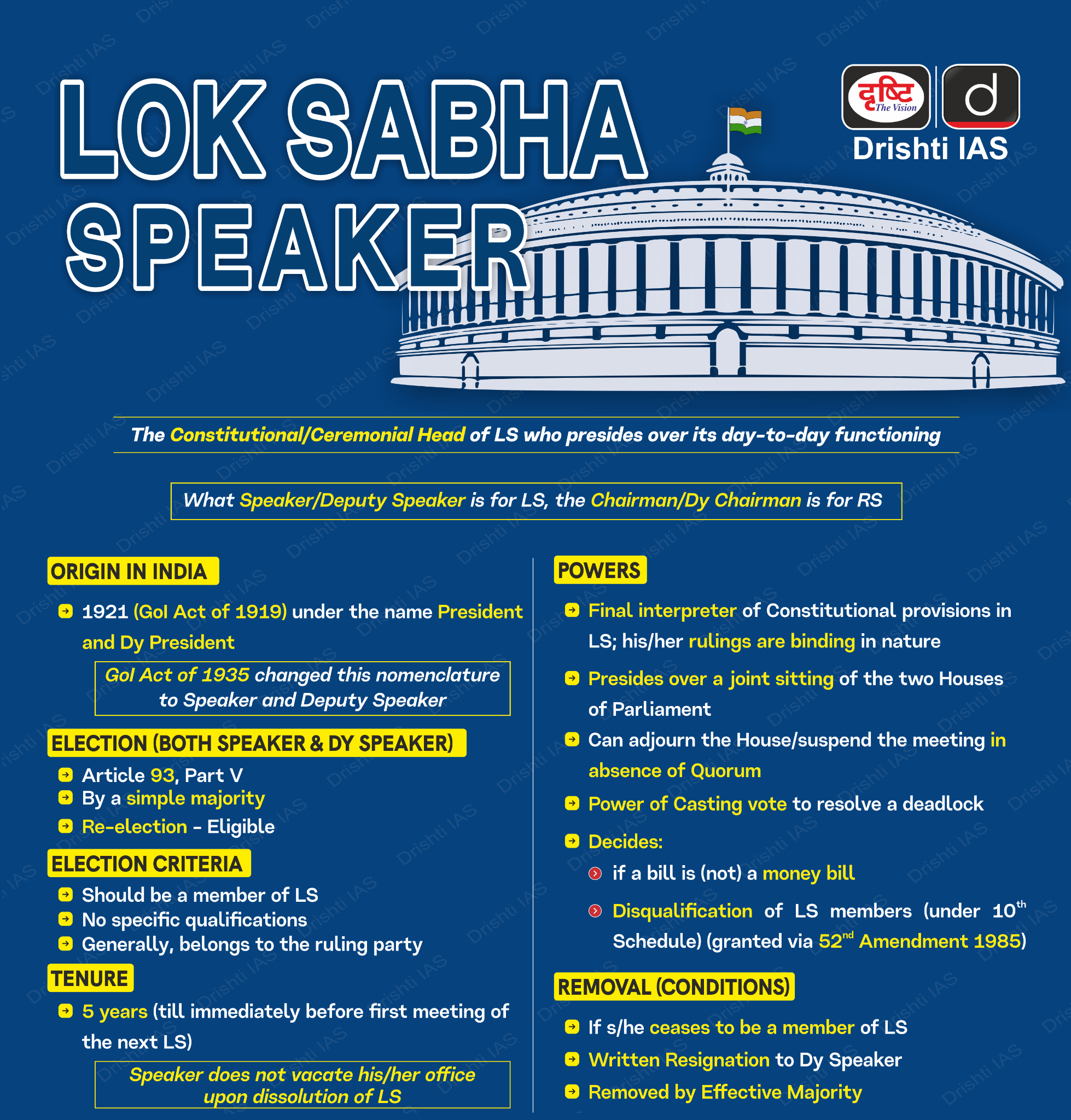Important Facts For Prelims
Deputy Speaker of Lok Sabha
- 26 Jun 2024
- 6 min read
Why in News?
- The recent increase in the Opposition's strength in the Lok Sabha has reignited their interest in securing the Deputy Speaker's post.
- This post has remained vacant throughout the 17th Lok Sabha (2019-24), marking a departure from the 16th Lok Sabha (2014-19) where a Member of Parliament (MP) from the ruling party’s ally held the office.
What is the Role of Deputy Speaker?
- Constitutional Provisions:
- Article 95(1): It provides that the Deputy Speaker performs the duties of the Speaker if the post is vacant.
- The Deputy Speaker has the same powers as the Speaker when presiding over the House.
- All references to the “Speaker” in the Rules are deemed to be references to the Deputy Speaker as well for the times when he or she presides.
- Article 93: It provides that Lok Sabha must, as soon as may be, choose two members of the House to be respectively Speaker and Deputy Speaker.
- Article 178: It contains the corresponding provision for the Speakers and Deputy Speakers in the State Assemblies.
- Compulsion of Choosing Deputy Speaker:
- The Constitution does not specify a time frame for choosing a Deputy Speaker, that allows governments to delay or avoid its appointment.
- Article 93 and Article 178 use the words “shall” and “as soon as may be” which indicates that not only is the election of the Speaker and Deputy Speaker mandatory, it must be held at the earliest.
- Rules for Election:
- The Speaker/Dy Speaker is elected from among the Lok Sabha members by a simple majority of members present and voting.
- The election of a Deputy Speaker in Lok Sabha is governed by Rule 8 of the Rules of Procedure and Conduct of Business in Lok Sabha.
- The election of the Deputy Speaker usually takes place in the second session but can occur in the first session of the new Lok Sabha or Assembly.
- The Deputy Speaker continues in office until the dissolution of the House.
- Resignation/Removal:
- Under Article 94 (and Article 179 for state Assemblies), the Speaker or Deputy Speaker will vacate office if they cease to be a member of the House of the People.
- They can also resign or be removed from office by a resolution of the House of the People passed by a majority of all the members (absolute majority).
- Deputy Speaker from Opposition:
- As per the Parliamentary Convention, the opposition party has held the post of Deputy Speaker of Lok Sabha on several occasions. This includes during the Congress-led UPA-I (2004-09) and UPA-II (2009-14) governments, as well as during the tenure of Prime Ministers Atal Bihari Vajpayee (1999 to 2004), P V Narasimha Rao (1991-96), and Chandra Shekhar (1990-91).
Deputy Speaker Appointed as Speaker
- After the first Speaker, G V Mavalankar died in 1956 without completing his full term, Deputy Speaker M Ananthasayanam Ayyangar filled in for the remaining tenure of Lok Sabha from 1956 to 1957.
- Ayyangar was later elected as Speaker of the second Lok Sabha.
- Similarly, after G M C Balayogi passed away in 2002, Deputy Speaker and Congress MP P M Sayeed became acting Speaker for two months until Manohar Joshi was elected Speaker.
Read more: Deputy Speaker Election
UPSC Civil Services Examination, Previous Year Question (PYQ)
Q1. Consider the following statements: (2017)
- In the election for Lok Sabha or State Assembly, the winning candidate must get at least 50 percent of the votes polled, to be declared elected.
- According to the provisions laid down in the Constitution of India, in Lok Sabha, the Speaker’s post goes to the majority party and the Deputy Speaker’s to the Opposition.
Which of the statements given above is/are correct?
(a) 1 only
(b) 2 only
(c) Both 1 and 2
(d) Neither 1 nor 2
Ans: (d)
Q2. Regarding the office of the Lok Sabha speaker, consider the following statements: (2012)
- He/She holds the office during the pleasure of the President.
- He/She need not be a member of the House at the time of his/her election but has to become a member of the House within six months from the date of his/her election.
- If he/she intends to resign, the letter of his/her resignation has to be addressed to the Deputy Speaker.
Which of the statements given above is/are correct?
(a) 1 and 2 only
(b) 3 only
(c) 1, 2 and 3
(d) None
Ans: (b)





